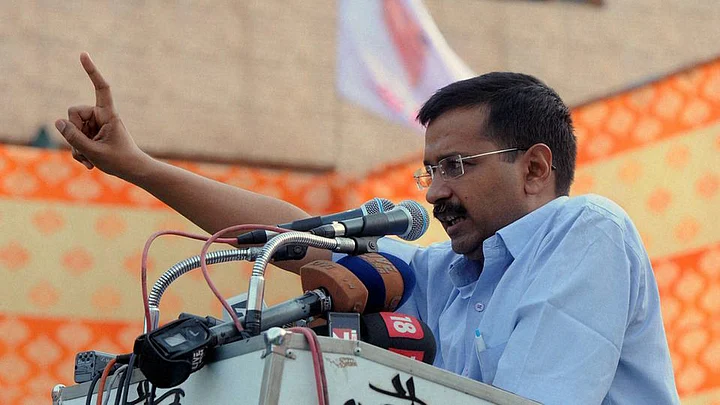(In the context of the Delhi High Court’s order stating that the Liutenant Governor, represented by the Centre, is the “administrative head” of the state – a judgement which is being seen as a severe blow to chief minister Arvind Kejriwal – The Quint is republishing a piece from its archives. The article first appeared on 13 July 2015.)
Just when you think that Chief Minister Arvind Kejriwal has run out of ideas trying to attract attention towards issues no one thinks about, he conjures up something that leaves his political rivals bemused. Presumably drawing inspiration from Greece, he has asked his Urban Development Minister about the feasibility of conducting a referendum on full statehood. Delhi’s Law Minister has been quoted as saying that the Delhi government would enact a new law, if required.
Delhi’s Statehood Referendum
- Referendums were used twice, in India, during the Partition: in the then-North-West Frontier Province (NWFP) and in Sylhet district of Assam.
- Police, law & order and land are not with the Delhi government. Constitution allows the LG to refer any issue to the Government of India.
- Congress and BJP have, in the past, promised statehood but, eventually, backed out
- While, the Spanish government declared its referendum illegal, Catalonia went ahead with the referendum. Will Delhi follow a similar pattern?
History of Referendums in India
Outlandish as it may seem, the idea is an intriguing one, though, unlikely to materialise. Referendums are not unknown in India.
They were twice used during the Partition, in the then North-West Frontier Province (NWFP) and in Sylhet district of Assam, to determine the wishes of the population. And in the peculiar circumstances of the liberation of Goa where the colonial power was forcibly removed, Nehru had given an undertaking that the wishes of the people would be ascertained before finalising the constitutional arrangement for the territory.
Though the ruling Maharastrawadi Gomantak Party wanted to merge Goa with Maharashtra, the Government of India (GOI) was persuaded that this must be decided by the people at large and not by the Legislative Assembly. Accordingly, the Parliament enacted the Goa, Daman and Diu (Opinion Poll) Act, 1966, and the opinion poll was held on January 16, 1967. Though it was called an opinion poll, it was a referendum in all but name since its results were binding. Constitutionally, for a referendum/opinion poll to take place, the Parliament would have to enact the enabling legislation.
Delhi’s Ambiguous Governance Roles
Kejriwal’s case is that since his government does not have the requisite powers, he is unable to deliver on his promises.
The constant wrangling between the Lt Governor (LG) and the CM over who to appoint as the acting Chief Secretary for 10 days when the regular incumbent was on leave, resorting to litigation for control over the Anti-corruption Bureau, the presence of two home secretaries appointed by them separately and other drama has succeeded in keeping attention away from actual governance.
Instead, it has brought into focus the unclear constitutional arrangements governing Delhi.
Large federal countries have not been able to resolve how their capital cities can be run, other than Germany, which has made Berlin into a State on par with others. In the US, Canada and Australia for example, local governments have limited autonomy, though there is no uniform pattern. Politically, administrative and often fiscally, the central government keeps firm control of the nation’s capital city.
In India, police, law & order and land are not with the Delhi government. The Constitution further allows the LG to refer any issue, where there is disagreement with the elected government, to the Government of India. Pending the GOI’s final decision, the LG’s order on the issue prevails. Over the two decades since Delhi has been run by its own elected government, certain practices have developed, but the legal position remains ambiguous. This includes the role of the LG in day-to-day decision-making including the posting of officers.
Politics Behind Kejriwal’s Statehood Bid
Kejriwal’s unstated position is that the Parliament is unlikely to grant statehood to Delhi as no ruling party in the GOI would agree to it. At different times, the Congress and the BJP promised it in their local election manifestos but backed out when the time came to actually move forward with it. Or, they have found it difficult to find the right mix of delegation and control.
More than Greek PM Tsipras, who called for the referendum to strengthen his hand domestically since ultimately he would have to backtrack from his hard-line stance, Kejriwal seems inspired by the non-binding referendum in Catalonia last year. The regional government decided to conduct a referendum on independence. The Spanish government moved the nation’s Constitutional Court, which declared the referendum illegal. So Catalonia went ahead with its non-binding referendum, which was carried by 80% of those who voted; however, over 70% of the voters stayed away.
Kejriwal lacks the legal and financial powers to conduct such a non-binding referendum but he has succeeded in making Delhi’s constitutional and administrative arrangements an important issue. And there is no doubt that ultimately the local government would be able to wrest more powers from the GoI and make itself more accountable to Delhiites.
(The writer, a former Principal Secretary, to the Government of Delhi, is Director, South Asian Institute for Strategic Affairs.)
